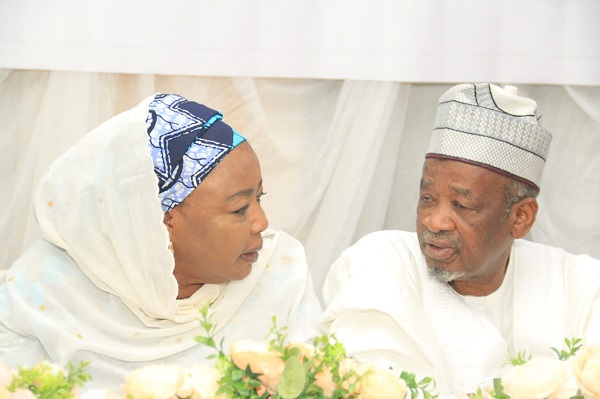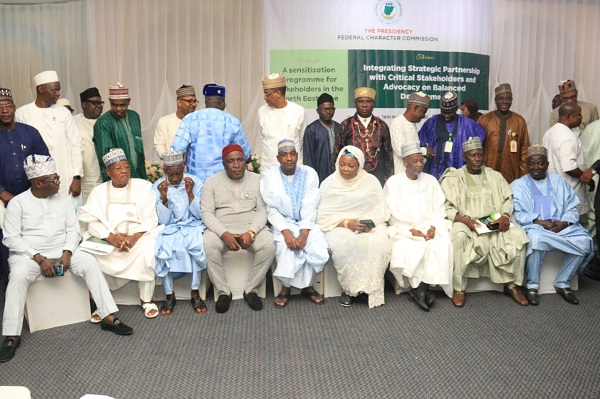
The executive chairman, Federal Character Commission (FCC), Dr. Muheeba Dankaka has hailed the commission for its strategic role in the promotion of peace and national development in Nigeria.
Speaking at the opening ceremony of its sensitisation workshop for stakeholders in the northeastern zone themed “Integrating Strategic partnership with Critical Stakeholders and Advocacy on Balanced development” in Abuja, she said over time, one critical, recurring factor has been the lack of understanding and perception of Federal Character principle among the people and, specifically, amongst stakeholders.
According to her, this deficit of comprehensiveness has, in many ways, affected the total implementation of the principle of equity, justice and fairness in the distribution and proportional sharing of not only bureaucratic posts but the more germane and widely acclaimed distribution of infrastructural facilities, resources, and social amenities among the federating units.
She stated that the commission commenced a deliberate policy to advocate a series of interactions with stakeholders that are directly or indirectly involved with the implementation.
“This, it is believed, will pave the way for the actualisation of the Federal Character principle and eliminate suspicion and feeling of marginalisation and alienation among the citizenry,” she added.
In his presentation on ‘Federal Character Clauses and national Unity’, the special adviser to the commission’s executive chairman, Dr. David Fakeye explained that Federal Character is the distinctive desire of the people of Nigeria to promote national unity, foster national loyalty and give every citizen of Nigeria a sense of belonging.
He also stated the objectives of the Federal Character principle as “a measure to check the problem of inequality and marginalization arising from lopsidedness in employment, appointments as well as social amenities and infrastructures. Second, it is a measure of equitable distribution of appointments, employment, opportunities and natural and economic resources for the benefit of the citizens”.

Fakaye added that despite the elaborate constitutional clauses as stated in the constitution, there was no organ of government before the establishment of the Federal Character Commission saddled with the responsibility of enforcing the policy, and therefore remained non-justiciable.
He further stated that stakeholders’ engagement is one of the cardinal strategies of the Federal Character Commission for sustainable decisions to achieve results, meet targets, attract experts and increase awareness and buy-in into its activities. He concluded by saying that the implementation of the Federal Character principle has contributed positively to promoting national unity because, without it, things would have been worse and when viewed in the light of our historical past, the principle expresses a worthy objective for national unity and integration.
In his remarks, a consultant to the executive chairman, Federal Character Commission, Dr. Vincent Onobun established that in many aspects, the challenges of development that Nigeria faces are hardly unique. He added that they are products of the country’s stage of development and of her cultural, ethnic and religious diversity.
According to him, terminologies such as ‘marginalisation’, ‘division’, ‘exclusions’, ‘segmentation’, ‘segregations’, ‘discriminations’, ‘lopsidedness’, etc., especially associated with the distribution of material resources as provided by ministries, departments and agencies (MDAs) as the executing channels for government, points the way for development or otherwise.
He defined balanced development as equal development of all regions within one country, through the decentralisation of resources and better, special and functional distribution and social cohesion of all persons that stand to benefit (utility).
Onobun listed the challenges Nigeria faces as an expression of her need for equitable administration of resources amongst the various levels of government and nationalities that constitute the Federation.
He mentioned that the two major problems faced by the socio-geopolitical configuration of Nigeria are manpower management of her diverse people and socioeconomic infrastructural management.
Onobun added that the diversity of Nigeria is a reality and, thus, these assets must be managed creatively and reasonably. “If we desire a balanced development in a balanced Federation, we must all ensure that there is guaranteed, assured, and protected equity in the execution and distribution of capital projects by MDAs to be assured of balance and equity in the polity.

